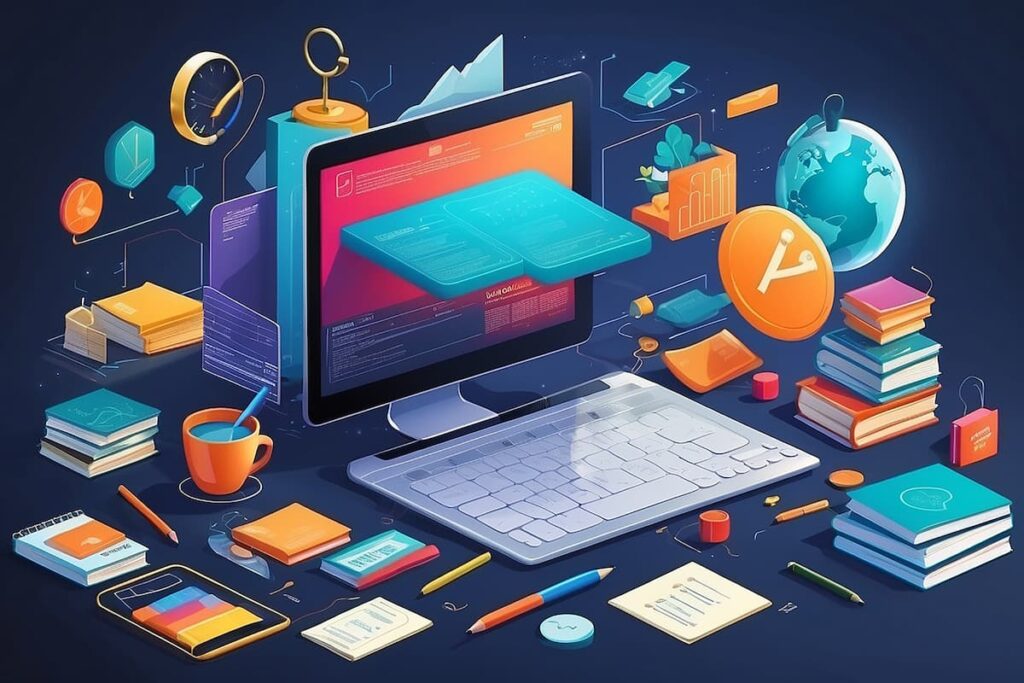Artificial intelligence has moved beyond being a buzzword known only to software teams and industry insiders. Instead, it is now influencing various industries, from marketing to finance. Fortunately, education is no exception. Today, AI is changing the way we teach, learn, and manage educational settings, creating new startling opportunities.
The integration of AI into education is transforming conventional teaching methods, administrative tasks, and student engagement approaches. AI-powered adaptive learning platforms, automated grading systems, and personalised learning assistants improve the efficiency of educational establishments and offer tailored learning experiences for students.
As a result, the users can customise educational content to fit unique requirements, address knowledge gaps, and foster a more inclusive learning environment whilst at the same time giving back to educators to do what they do best: develop learners.
At Altamira, we are paving the way in the EdTech arena by bridging education and technology gaps by empowering learning and teaching with brand-new solutions.
Today, we would like to bring up the topic of EdTech market situation. What are the emerging trends and challenges? What advancements will we see in the near future? How does Altamira help speed up the time it takes for EdTech product development to generate revenue?
Before we go any further, we are excited to introduce our panellist – Altamira’s Education Sector Consultant (Growth and AI Application Specialist), Conor Gately. Bringing a wealth of experience from IBM, Xerox, IRIS Software Group, and McGraw Hill across services and digital transformations, Conor leads successful initiatives driving revenue growth, cost efficiency, and strategic sales triumphs. Conor’s viewpoint is invaluable for any business looking to positively impact people and the communities they serve with the help of technology.

What is the current situation in education right now? How would you describe it?
Learning can be compared to building a Jenga tower; you start with a solid foundation and then progressively add pieces of knowledge on top. If students build on an unstable base, they are likely to struggle and may eventually conclude that they fall short compared to someone else.
In the traditional education system, countless students have missed out on life opportunities—such as internships, university admissions, scholarships, and career prospects—simply because they perceived themselves as not good enough.
A student perceiving themselves as not good enough, that’s not right. As Nelson Mandela famously said, “Education is the most powerful weapon you can use to change the world.” With the proper resources, every student can achieve success.
Educational technology is evolving swiftly, enabling educators to customise learning for students from all backgrounds and skill levels. When properly managed, I am confident that the right application of EdTech tool’s and processes can serve as a powerful equaliser—addressing each student’s needs, identifying knowledge gaps, and enhancing their understanding of core subjects.
Are there any prejudgments in the education sector related to AI?
Definitely! AI is transforming our world, and we can either perceive it as a threat or embrace it as an opportunity. Many discussions about AI in education are driven by fear and bias. For example, educators worry that students might use AI to cheat or plagiarise, but these fears have not been supported by any research or study. Instead, a recent study from Stanford University found that AI chatbots have not led to increased cheating among high school students. The research proves that the incidence of cheating has remained surprisingly stable.
So, instead of leaving a student alone with an iPad and expecting them to learn independently, consider AI as a collaborative educational tool. Engage with students to identify their strengths and areas needing improvement and leverage AI-generated personalised lessons to target existing challenges. Establish clear learning goals, track their development, and find ways to inspire them by connecting with their interests, gamification can be extremely powerful for engagement.
AI can provide students with much more than simply doing their work for them. Don’t let fear of potential downsides obscure the numerous benefits AI brings to the table. Teaching students to use AI ethically and to think critically about new technologies are essential skills that will benefit them now and then in the future.
AI is here to stay, and it is becoming an inevitable part of the business world. Our students mustn’t be excluded from this transformative technology.
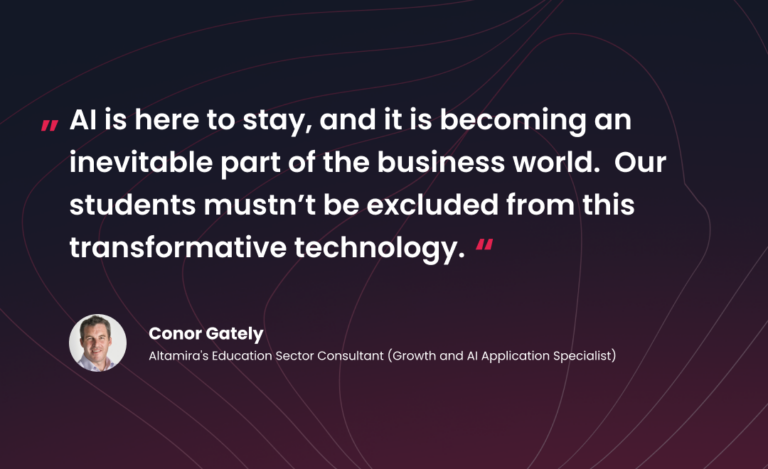
What trends do you anticipate in education?
The EdTech sector presents abundant investment opportunities. Recent advancements include tools that provide personalised learning experiences and enhance learners’ accessibility.
With advanced technologies, we can track trends such as students’ interests in specific subjects, their preferred learning methods, and effective educational approaches. We can assist educators in designing tailored lesson plans, analysing student progress, and recommending assignments based on individual performance. Imagine the difference such a personalised approach could make for supporting students with specials educational needs.
I see artificial intelligence as an up-and-coming innovation that could fundamentally transform positively teaching and learning methods and aid teacher recruitment/retention.
Generative AI holds immense potential to introduce brand-new tools that inspire students, deepen their grasp of complex concepts, and foster creativity and enthusiasm for learning and problem-solving.
As we advance towards a future where human capabilities are augmented by AI, the skills of adaptation, problem-solving, and lifelong learning will become increasingly important for achieving success. Yet, technology alone isn’t a universal solution; it must be carefully woven into educational frameworks to yield tangible benefits for students and educators.
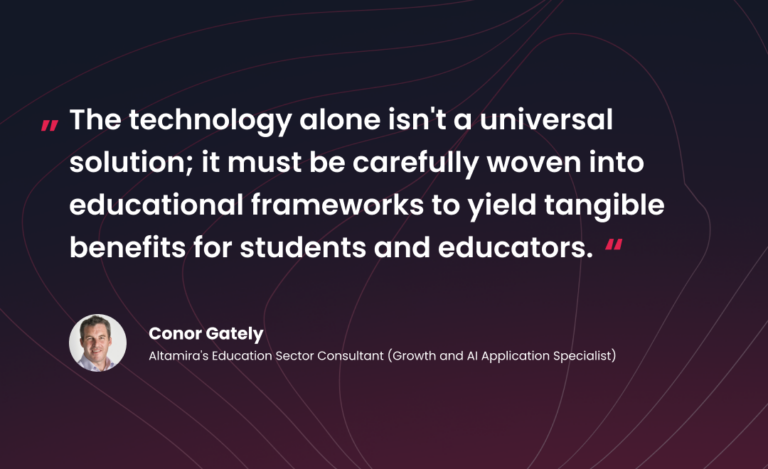
What is the situation in corporate education?
Education has shifted from a single event to a lifelong journey. Success in the future will belong to those who embrace adaptation and ongoing learning. All you need to learn a new skill is curiosity, aptitude, and access to an internet-connected device.
The traditional model of corporate training, which often relied on periodic, in-person sessions, is being replaced by more flexible, continuous, and technology-driven learning methods, which are often immersive.
One of the greatest shifts is the move towards personalised learning experiences. By using AI and machine learning, companies now tailor educational content. Employees get a chance to progress at their own pace, revisit challenging concepts, and apply their new skills in real time.
What’s even more interesting is that corporate training today more and more often focuses on soft skills, such as leadership, communication, and emotional intelligence, alongside technical skills. Businesses recognise that investing in their employees’ holistic development is key to improving performance and retaining top talent, particularly where hybrid working is embedded in organisations.
Another significant trend is the collaboration between corporations and educational institutions. Many companies partner with universities and online course providers to develop customised programs that address specific industry needs. Such partnerships help bridge the gap between theory and practice, ensuring that employees acquire relevant, up-to-date knowledge.
Today, both schools and businesses are seeking solutions that can be implemented quickly to meet immediate needs (e.g., remote learning tools or new compliance training in the corporate sector), as it directly impacts how swiftly organisations can materialise financial and operational benefits.
However, from my perspective, investing in EdTech offers more than just financial returns; it involves fostering a generation of learners and educators who are prepared for the challenges ahead.
What specific services or solutions does Altamira offer that cater to the needs of EdTech clients?
It is clear without saying that every client wants to have the solution quicker and cheaper. At Altamira, we understand these priorities and are committed to delivering on them. We consistently tailor approaches that help us compress the software development lifecycle by developing quicker without sacrificing quality and staying within the budget. By focusing on the optimisation of our development processes, we reduce product’s time-to-market.
As a result, we accelerate our clients’ time to revenue, improve the predictability of their revenue streams, and contribute to a more stable and sustainable revenue model. By enabling our clients to realise returns on their investments sooner, we provide them with a crucial market advantage.
Among others, I’d like to highlight the core four aspects we take pride in.
Comprehensive database of ready-to-use components
Our extensive database of ready-to-use components, meticulously collected over the years, means we can jumpstart your project with proven, reliable modules. This accelerates development, reduces costs, and ensures that your solution benefits from the latest advancements and best practices in EdTech technology.
Rich repository of prototypes
Our vast database of collected prototypes allows us to provide you with a range of pre-built options tailored to various educational scenarios. This speeds up the ideation and design phase, enabling rapid prototyping and validation of concepts, ultimately reducing time to market and enhancing your ability to innovate quickly.
Expertise in non-functional and security requirements
With years of experience, we have developed a deep understanding of the non-functional and security requirements critical to the EdTech domain. Our solutions are designed to be robust, scalable, and secure, ensuring compliance with industry standards and safeguarding sensitive educational data.
In-depth domain knowledge and competitive insights
Our profound understanding of the EdTech domain’s unique needs, challenges, and competitive landscape allows us to conduct a thorough analysis. We provide valuable insights and innovative ideas that address your specific needs and help you stay ahead of competitors. Our expertise accelerates the analysis stage, enabling us to offer strategic recommendations that drive impactful results.
In addition, we create solutions that directly tackle genuine educational challenges, focusing on technology that improves learning outcomes rather than introducing unnecessary complexity. This requires ongoing engagement and feedback loops with users to develop solutions that truly meet and enhance the needs of the educational community.
As we prioritise scalability, we pay attention to resilient backend infrastructures capable of managing heightened demand without sacrificing user experience.
Holding ISO 9001 and ISO 27001 certifications and being compliant with GDPR and other data protection regulations, we treat data security responsibly. Our commitment safeguards users, fosters trust among stakeholders and ensures compliance with educational regulations and standards.
What sets our services apart from competitors in the EdTech market?
The traditional “one size fits all” model is no longer suitable. Today, the faster a company can implement a solution and demonstrate its value, the quicker it can generate revenue from adopted solutions. So, our proven Compressed Software Development Lifecycle toolkits deliver your MVP/POC in a timely manner as well as being proven at improving time to revenue for new solutions.
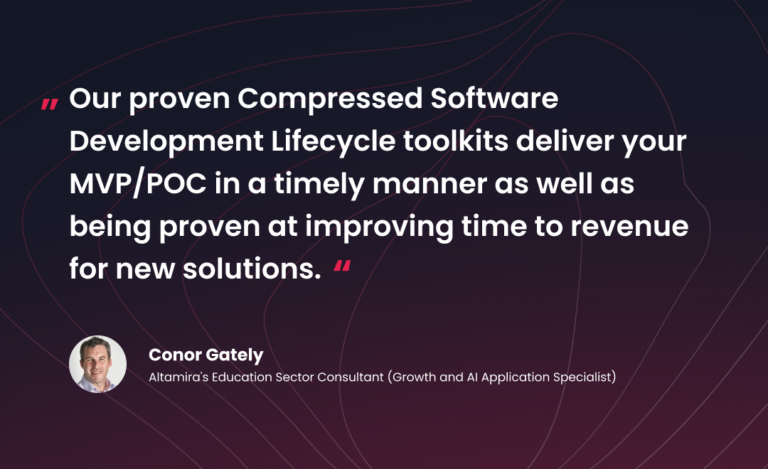
At Altamira, our approach to EdTech isn’t just about delivering high-end solutions fast; it’s about forging enduring partnerships. We position ourselves as more than a vendor—we’re committed to being a lasting partner in our Clients’ growth journeys. This means we invest time and effort into understanding the Client’s unique challenges and aspirations, aligning our strategies to support their long-term success.
We design our EdTech solutions with future growth in mind, ensuring they can adapt and expand alongside your needs. Whether it’s deploying AI-powered learning platforms or implementing robust infrastructure, scalability allows us to meet the evolving demands without compromising on performance or user experience.
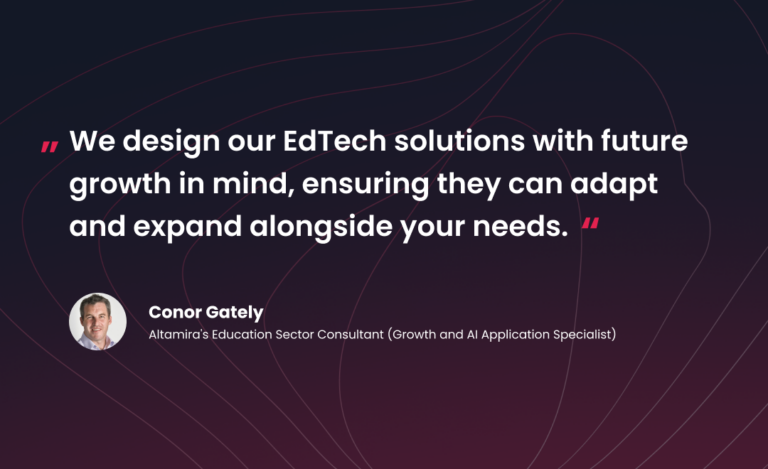
Besides, our passion for client success drives everything we do. It’s not just about delivering a product; it’s about empowering our Clients to achieve their goals and exceed expectations. At the same time, we believe in open communication and mutual trust. From project inception to completion, we keep our Clients informed every step of the way. This transparency fosters collaboration, enables informed decision-making, and ensures we always remain on the same page.
What advice would you give to organisations considering our services?
Here’s my advice: choose the vendor keeping in mind the cultural fit. Make sure the service provider shares similar values, attitudes, and beliefs. This alignment ensures a cohesive partnership where both parties can effectively work towards common goals.
Avoid blindly following initial impressions and appealing sales pitches. Instead, challenge the teams and question how the price quote was formed. Ask to meet the team you’ll be collaborating with to test the chemistry before the project kick-off and ensure alignment in vision and values.
Communication and alignment are key to a successful partnership. At Altamira, we take pride in collaborative relationships where transparency and open dialogue pave the way for shared success. Our goal is to work closely with clients to deliver tailored solutions that address their specific needs and aspirations.
In a nutshell, when considering a vendor, don’t underestimate technological offerings but still evaluate the potential for collaborative synergy.
The final words
The conventional labels of A, B, or C / 9, 8 to 5 students limit the potential for personalised learning approaches. I advocate for rethinking education entirely, with EdTech serving as a cornerstone.
It’s important to provide every student with tailored learning experiences that foster academic excellence. In this perspective, there are no “C students”—only individuals on a journey to mastery and realising their utmost capabilities.
We believe in educating our clients about industry trends, best practices, and emerging technologies that could benefit their operations. By delivering products that could be quickly developed and deployed, we help clients to tap into new revenue opportunities.
We actively solicit input throughout the engagement, whether through formal feedback sessions or casual conversations.
This feedback loop ensures that we’re not just meeting expectations but continually evolving and improving our services based on our client’s needs bringing some extra value every single time.


